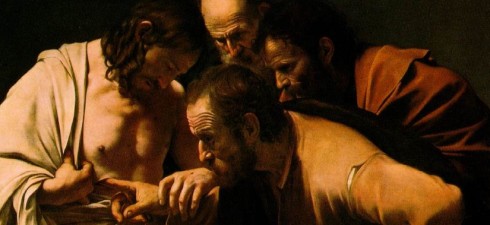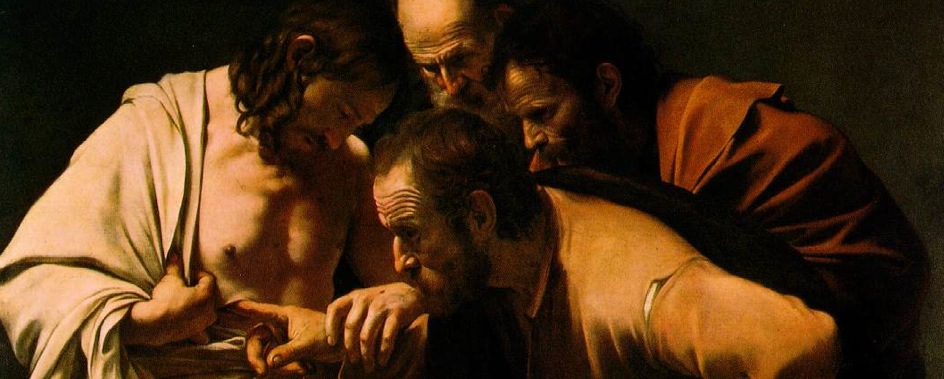“Faith is like a little seed. If planted it will grow,” sing the Primary children. The Book of Alma extends the metaphor of faith as a seed beautifully. While I’m not sure where doubt fits into the metaphor (an unopened seed package?), I wish we had a song about not knowing as well. Perhaps a talented lyricist could adapt some verses from the Gospel of John chapter 20 into a hymn.
Thomas, one of my favorites in this chapter, wasn’t the only disciple who didn’t believe the news of the resurrection upon first hearing it. The Gospel of Mark points out that the men do not believe Mary Magdalene when she reports the empty tomb and the Gospel of Luke notes that the men discounted the news from Mary Magdalene, Joanna and other women as “idle tales.” The story was a hard one to swallow, in other words. (Let’s set aside the sexism for now…) Some of those early disciples needed more than someone else’s words. When Jesus met them in a garden, walked with them on the road to Emmaus or dined with them in his risen form, he was a walking witness, living proof.
Thomas was not with the group during the visitations from Jesus and having not been there, did not believe. John 20: 25 says, “The other disciples therefore said unto him, We have seen the Lord. But he said unto them, Except I shall see in his hands the print of the nails, and put my finger into the print of the nails, and thrust my hand into his side, I will not believe.”
As a result, Thomas has had to bear a rather derogatory reputation as the doubter within some factions of Christianity lo these many millennia. The label makes him sound like some kind of disciple deadweight, the dud of the group, a hanger-on who didn’t have the good sense to be in the right place at the right time and then wanted a witness of his own. Some nerve or completely understandable?
Jesus seemed to understand. As the story continues, and on a day when Thomas was in the right place at the right time, Jesus comes to meet the disciples and greets them with peace. He seems to know Thomas’s mind and heart, for in John 20: 27, we read, “Then saith he to Thomas, Reach hither thy finger, and behold my hands; and reach hither thy hand, and thrust it into my side: and be not faithless, but believing.”
Thomas’s reaction – “My Lord and my God” – is one of belief and worship. The image of Thomas offering one finger and receiving the full hand of God is tender. The doubter now has the benefit of an undeniable witness, of tangible proof, of sensory indications outside of his own mind. His faithlessness is not swept under the rug, but clearly addressed and replaced. His request has been granted, his question answered, not ignored.
Then comes the up for grabs verse, the 29th in the chapter: “Jesus saith unto him, Thomas, because thou hast seen me, thou hast believed: blessed are they that have not seen, and yet have believed.”
I have heard more than one LDS member criticize Thomas’s approach (a demand for his own witness) using this verse as the critical bludgeon, and yes, I concede that Jesus expresses a special blessing on people who do not need such proof to believe. (In fact, this chapter of the Gospel of John ends by pointing out that the included stories are written for the express purpose of helping people who weren’t there and didn’t see to believe, a kind of transcription of an eyewitness report.)
But in my reading of this translation into English from Latin of the original written-in-Greek version of the oral tradition that came into existence during the century after the death of Jesus (read that with a smile, please), I do not see anything that implies that Thomas is lesser or inferior than those who are satisfied with someone else’s report. There is no “but” or “yet” in this KJV text, only a colon. Thomas wanted his own living witness and Jesus gave it to him in an incredibly personal, intimate gesture.
So it is with us and our merry latter-day band of motley disciples. Some believe as soon as the seed is placed in the ground. Some don’t even bother looking at the picture on the front of the seed packet. Others believe after they’ve watered or seen someone else holding the hose.
And some of us want to have a nice juicy tomato in hand, okay?
As someone whose spiritual green thumb has changed hues over the years, I am glad for the reminder that there is room in the garden for planters, for waterers, for weeders and harvesters – and even for those who have little more than the feel of sunshine on their cheeks and a memory of the taste of last summer’s freshly picked sweet corn on their tongues.


This is lovely. Thank you. (Plus you get bonus points for using my favorite Caravaggio!)
Erin – I love this piece and the interplay of Jesus and his understanding towards Thomas. You get extra credit points from me for using the phrase, “our merry latter-day band of motley disciples.” I may have found a label that finally feels right.
I’m pausing to wonder how much of my spiritual life I’ve spent watering, weeding, and harvesting. It’s also been important to build support stakes, improve the soil, and have complementary vegetation growing nearby. And, don’t forget the fertilizer. That shit is the best stuff for growing up big and strong.
Beautifully put. I’ve often thought of this story and these verses in the context of the Sacred Grove, the need Joseph had to go into the woods and find out for himself. I think, that on some level, even the believing without seeing-types have to know for themselves in some way.
Love this, Erin. The last paragraph, especially!
We need to have a good late night discussion about this, block out a couple hours, make sure we’ve got some good snacks, kids are asleep, etc.
Can I come?
The way this is set up, it suggests a 2×2 matrix. The four cells are 1) don’t see / believe, 2) don’t see / don’t believe, 3) see / believe, 4) see / don’t believe. I have a hard time with this passage in the Bible because it’s a prescription for abuse. Proponents of ANY belief system could show up on your door and use #1 to get you to opt in. Most people remain in the faith tradition into which they are born, but just in case someone is thinking about leaving, #1 can always be used, right? If they have a problem with their faith, then the advice is always to just keep believing, because that’s what God expects (and will reward eventually). #1 does not seem like an admirable place to be. It requires a surrender of personal responsibility. It suggests that individuals shouldn’t use the brain God gave them. Holding up #1 as an exemplar undermines personal spiritual integrity, because it implies that personal judgment and the exercise of our own spirituality is somehow less valuable that blind following.
Labeling the four different cells in the 2×2 matrix and discussing what each requires would be an interesting exercise.
That I fully love this the introduction for the point,thank you so much!